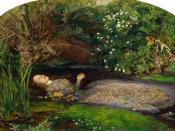Being emotionally distraught has led many down a road of questioning self-worth, resulting in a dead end with only suicide to turn to. In the play Hamlet, William Shakespeare disparagingly pulls Ophelia through a barrage of confusion and pain, diminishing her confidence and mental stability ultimately leading to her demise.
A vulgar attack from Hamlet leaves Ophelia in doubt; worrying for him while his destructive words dismantle her ego. While attempting to find out if Hamlet is crazy, Ophelia finds she gets more than she asked for when he tells her, "You should not have believed me; for virtue cannot so inoculate our old stock but we shall relish of it. I loved you not" (III.i.146). For the first time she is subject to mistrust, but doesn't understand this and instead is astonished at what was just said. Probably never a victim of abuse, she doesn't know how to deal with this maltreatment.
Ophelia falls into a self-destructive path when she says, "And I, of ladies most deject and wretched, that sucked the honey of his music vows" (III.i.148). Ophelia deals with her new pain by blaming herself for Hamlets actions, further instigating her problem of an oncoming mental breakdown. She takes Hamlets apparent condition as her responsibility along with the emotions that are attached. Ophelia is not only troubled by Hamlet, but equally by herself.
Ophelia's dependence of men in her life leaves her mind and soul stripped as her father and Hamlet are abruptly taken from her. With odd imagery she sings in front of the king and queen, "Young men will do't if they come to't - by cock, they are to blame. Quoth she, 'Before you tumbled me, you promised me to wed'" (III.i.228). Obviously distressed over the absence of Hamlet, she sings disorderly and incoherently with others unable to make sense of her babbling. With her love gone she has no one to confide in and is left to deal with her pain on her own as her thoughts must be erratic and stressed. Her agony stems from her father's death though, as this bereaved girl sings moments earlier "White his shroud as the mountain snow"(IV.v.226) and "Larded with sweet flowers which bewept to the grave did not go with true-love showers"(IV.v.226). Ophelia's lunatic ravings reveal much of her state of mind as she is obsessed with death and beauty. Her grief overcomes any sanity she had left and is unable to cope with her father's death. Without guidance, Ophelia is left to wander alone in a world which she was raised to feel protected in.
Suicide comes as no surprise in Ophelia's condition, after enduring extreme emotional torment, the loss of a loved one, and the death of her father. Being ill prepared for the real world, and never leaving a protected zone in which you feel safe, leads one to an unforeseen future of failure. The inability to rely on ones self or deal with the harsh realities of the world will invariably make life difficult.



Hamlet: Analyizing the character Ophelia.
There are very good points to this essay but I think it needs a little bit more explaining and describing Ophelia. Ophelia is a very complicated character.
0 out of 0 people found this comment useful.